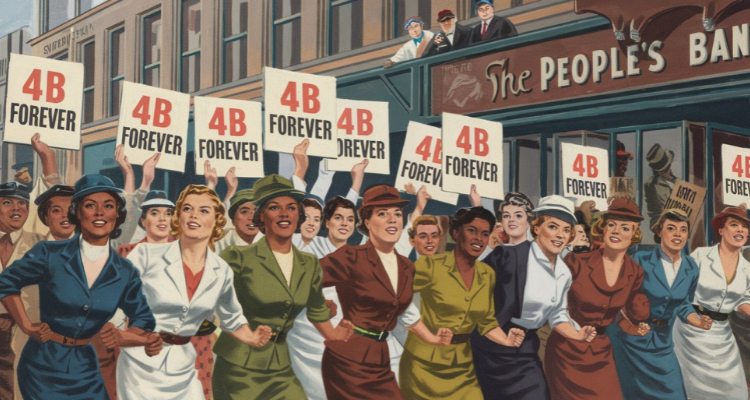4B or Not 4B?—That Is the Question
Some women have begun questioning the future of intimate heterosexual relationships

Is it too soon to tell if the recent interest in a South Korean feminist movement known as 4B will also result in a corresponding upswing in sex tech sales and AI boyfriends in other countries?
The New York Times says, “Searches for ‘4B Movement’ in the United States spiked the day after the election, according to Google Trends. Dozens of videos on the topic have popped up on TikTok in the last 48 hours, with users sharing why they are for or against the movement’s gaining steam in the United States.”
Among the dozens of TikTok users with 4B references in their user names or descriptions, one already has nineteen thousand followers and another, twelve thousand.
The 4B’s are South Korean words for dating, sex, marriage, and childbirth. In English it would be “DSMC,” sounding more like a pop group than an up and coming sociopolitical movement.
Why US feminists are looking to South Korea’s 4B
Joking aside, it could become a serious zeitgeist with roots in resistance and retaliation. Among heterosexual women in the US, attempts to de-center relationships with men have gained traction since the repeal of Roe v. Wade.
As Jada Mevs, a woman quoted in the New York Times article, said, “What really drew me to participating in this movement was taking my body and my best interest into my hands.”
It’s all very Lysistrata of Aristophanes, but, if the situation continues, where might it lead ?
The personal is political
The Lysistrata was produced in Athens in 411 B.C, about a group of women who protest the Peloponnesian War by withholding sex.
Thousands of years later, the 4B movement was formed by women protesting rampant sexism and discrimination in South Korea.
Meanwhile, in the United States, women are growing concerned about what many feel is an all out war on women, with the starkest example the overturn of abortion rights and threats to birth control access.
Additionally, the US gender gap may turn into a chasm. Misogynistic chants of “your body, my choice” sweeping the country after the recent election certainly don’t help.
What’s to be done? Could technology somehow solve this thorny predicament?
There may be a few possibilities, but they tend to appear like a departure from ideals held by our historic and current sex and pleasure positive revolutions. What could this mean for the future of sex?
The measure of a man?
The answer could be sex toys and AI boys. For people with female sexual reproductive organs, deciding to bypass sexual relations with cisgender men might invite a logical consideration of the merits of substitution.
What’s wrong with recruiting an AI chatbot boyfriend (or two or more) for companionable conversations and sweet nothings—not to mention hot selfies on demand—and an array of enticing sex toys to simulate the physical part of the relationship?
This strategy makes sense given the new hazards of diminished sexual and reproductive health care in the US. Childbirth has always been a dangerous business but modern medicine has made it less so.
In other words, the emotional, sexual, physical and lifestyle choices that confront women in misogynistic cultures are calculations that do indeed take into account the measure of the men around them.
Expanding sexual options
Masturbation, with or without sex tech, is an excellent sexual enjoyment though some people who would like to continue having intimate contact with a partner might opt to stick with “outercourse.”
However given the current statistics regarding rape and sexual assault in the US, this could be a risky strategy if not already in an established relationship founded on trust. (And even that might not help.)
As for those sex toys we mentioned above, both partners can enjoy such things together.
Expanding partner options
From the Kinsey Scale to the Klein Grid and beyond, research has shown the actual behavior of human beings is far more flexible than most people acknowledge.
Dr. Alfred Kinsey introduced his scale of sexual behavior and orientation in Sexual Behavior of the Human Male, published in 1948. His research demonstrated that many people had sexual experiences and desires that were not exclusively heterosexual (ranked zero) or exclusively homosexual (ranked six).
The Klein Grid, created by Dr. Fritz Klein, was far more complex. Subsequent theories of sexual orientation and behavior are even more nuanced, acknowledging fluidity.
So it is not a stretch to suggest that in these post-Roe days, many heterosexual women may consider intimacy with partners who are not cisgender men or that heterosexual men who do not have female partners may choose to join the ranks of men who have sex with men but who do not identify as gay.
Permanent birth control
Another option for women concerned about unintended pregnancy or lack of access to birth control is to only date men who have gotten a vasectomy, assuming the surgery can be verified.
It’s worth noting that vasectomies are one hundred percent effective at preventing pregnancy and they are very low risk. According to the Mayo Clinic, they can be performed under local anesthetic as an outpatient procedure. Sometimes vasectomies can be reversed
For permanent birth control women may opt for hysterectomies or tubal ligations (“getting your tubes tied”), assuming they have the means and medical insurance to do so.
Another option is a salpingectomy, which completely removes the fallopian tubes. This surgery can lower the risk of ovarian cancer. All these operations are more complex and potentially riskier than vasectomies.
Consent counts in a positive sexual future
As a new kind of sexual revolution emerges one essential ingredient must persist—consent to sexual activity, or not.
Education and discourse on consent, and the active use of consent communication in human relations, must be emphasized not only to push back against restrictive policies and attitudes, but to continue to work towards a better world: one where rights to bodily autonomy, physical pleasure, health care, and emotional fulfillment are respected, not criminalized.
Ultimately movements like 4B are about personal agency and choice, and consent is crucial to agency. The question is, can we pursue agency while retaining our juice and joy, even while faced with personal and political upheaval?
Image Sources: A.R. Marsh using Ideogram.ai.

















